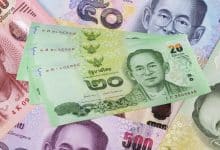Thai baht’s future forecast: Dollar domination looms on the horizon

Predictions by Kasikorn Research Center (K-Research) indicate a potential decline in the baht to 37 against the US dollar in the coming year. This anticipated depreciation is linked to a combination of a faltering Thai economy and a delay in American interest rate reductions, thereby placing the Thai currency under considerable strain.
Kanjana Chockpisansin, K-Research’s head of banking and financial sector research, attributes the baht’s depreciation, in comparison to other regional currencies, to recent data provided by the National Economic and Social Development Council (NESDC). According to Kanjana, the baht was trading at 36.10-12 against the greenback yesterday morning, a slight depreciation compared to Monday’s close of 36.02 baht to the dollar, reported Bangkok Post.
NESDC data released on Monday revealed disappointing economic performance for the fourth quarter of 2023, with expansion restricted to 1.7% year-on-year, falling short of projections. Furthermore, economic growth was down by 0.6 percentage points compared to the previous quarter. Consequently, government estimates for GDP growth in 2023 were downgraded from 2.5% to 1.9%, and the 2024 outlook was adjusted to 2.2-3.2%, a significant decline from November’s forecast of 2.7%-3.7%.
Such setbacks led K-Research to reduce its GDP growth estimate for the current year from 3.1% to 2.6%, given the expected slowdown in private consumption following the end of government stimulus.
The baht has seen a depreciation of 5.5% year-to-date, the second highest among regional peers, while the Japanese yen has weakened by 6.1%. In contrast, the US dollar index has seen a 3% increase.
Kanjana suggests that the Federal Reserve’s likely delay in cutting the policy rate until June, along with the weaker Thai economic data, could put further pressure on the baht. As a result, the baht could slide to 37 against the dollar later this year.
SCB Financial Markets forecasts a trading range of 36.05-25 for the baht, given the soft Thai economic data. This comes as Prime Minister Srettha Thavisin calls for an urgent special meeting by the Bank of Thailand to discuss interest rate reductions.
Kanjana added that the key factors to watch are foreign fund flows and the recent decision by the People’s Bank of China (PBOC) to reduce the five-year loan prime rate (LPR) by 25 basis points to 3.95%. This marks the first cut in eight months, aimed at stimulating the economy. The market had anticipated a reduction in both 5- and 10-year LPRs, but with only the 5-year rate being cut, the impact has so far been minimal.
Latest Thailand News
Follow The Thaiger on Google News:


























